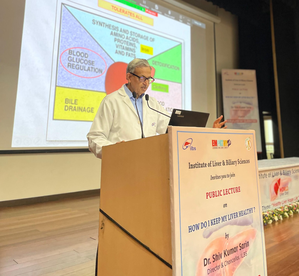'Illness To Wellness' and ILBS caution against rising cases of liver disease, stress urgent need to create awareness
By IANS | Published: April 24, 2024 04:16 PM2024-04-24T16:16:56+5:302024-04-24T16:20:08+5:30
New Delhi, April 24 The ‘Illness to Wellness’ initiative, a national campaign aimed at generating awareness on various ...

'Illness To Wellness' and ILBS caution against rising cases of liver disease, stress urgent need to create awareness
New Delhi, April 24 The ‘Illness to Wellness’ initiative, a national campaign aimed at generating awareness on various mind and body conditions and providing holistic and broad stakeholder engagements with the overall objective of promoting healthy living, in collaboration with the highly reputed Institute of Liver and Biliary Sciences (ILBS) focused on spreading awareness on the critical issue of liver disease, highlighting the essential precautions necessary for maintaining optimal liver health on the occasion of World Liver Day (April 19).
Illness to Wellness in association with ILBS hosted a Walkathon and a public lecture on April 20, commemorating World Liver Day, in which Dr Shiv K Sarin, Director & Chancellor of ILBS, delivered an insightful lecture titled 'How Do I Keep My Liver Healthy?' at the APJ Abdul Kalam Auditorium of the institute.
The lecture centered around the theme 'Healthy Liver Happy Life', aligning perfectly with this year's World Liver Day theme of 'Keep your liver healthy and disease-free'.
During the public lecture, Shiv K. Sarin highlighted the alarming prevalence of fatty liver among Indians, revealing that 1 in 3 individuals in the country are affected. Liver disease is a pandemic of mammoth proportions and fatty liver often precedes more serious conditions such as diabetes, high blood pressure, kidney diseases, and heart disease.
Dr. Sarin emphasised that the normal fat content in the liver should ideally be 5 per cent or less. However, if it exceeds 10 per cent, it indicates the presence of fatty liver. Fatty liver can stem from various factors, with obesity being considered to be the primary contributor. Other reasons could be conditions such as Type 2 diabetes mellitus or insulin resistance, elevated levels of blood cholesterol or high triglycerides, excessive alcohol consumption, and malnutrition.
Dr. Sarin also emphased the critical subject of prevention, stressing that alongside maintaining a healthy diet and regular exercise, individuals should prioritize undergoing SGPT tests to assess fatty liver presence. He urged for dispelling the misconceptions surrounding Hepatitis, emphasising that it is not to be associated with other diseases like AIDS.
He also stressed the importance of raising awareness about the transmission routes, clarifying that Hepatitis B is transmitted through blood and from mother to baby. Hepatitis B can be effectively controlled through universal vaccination of newborns as well as be provided to all people suffering from the disease, he said, adding that 90 per cent of people suffering from Hepatitis C are generally cured.
Anil Rajput, Chairperson, ASSOCHAM National CSR Council, said, “It is extremely important to be aware of liver health, understand the consequences of an unhealthy liver and take adequate precautions. The liver plays a central role in numerous bodily functions, and an unhealthy liver can have far-reaching consequences, exposing individuals to multiple diseases.
"Regular testing and proactive measures are important to detect and address issues before they escalate into serious conditions such as liver cirrhosis or cardiovascular problems. Raising awareness about Hepatitis B and C is essential to combatting the associated stigma and discrimination with these ailments, I implore all individuals to take charge of their liver health and focus on the critical aspect of prevention.”
In his compelling lecture, Dr. Sarin also talked about a critical aspect of liver health: The impact of fat accumulation potentially leading to severe conditions such as cirrhosis and liver cancer. He elucidated how excess fat in liver cells disrupts insulin function, preventing its proper absorption and forcing the pancreas to compensate by producing more insulin. Over time, this strain on the pancreas can culminate in the onset of diabetes.
The Walkathon dedicated to raising awareness on liver health was held on the morning of April 20, drawing enthusiastic participation from both healthcare professionals and members of the general public.
Disclaimer: This post has been auto-published from an agency feed without any modifications to the text and has not been reviewed by an editor
Open in app